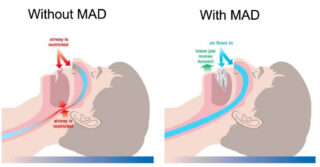
Dental Excellence Integrative Center
3116 Mount Vernon Ave
Alexandria, VA 22305

More Dental Health Articles
Sleep Apnea and Dental Appliances

Sleep apnea is a condition where a person’s breathing repeatedly stops and starts during sleep. It can cause loud snoring, daytime sleepiness, and other health issues.
Dental appliances, also known as oral appliances, are a common treatment option for sleep apnea. These appliances are custom-made by a dentist or orthodontist and are designed to be worn in the mouth during sleep.
There are two main types of dental appliances for sleep apnea: mandibular advancement devices (MADs) and tongue retaining devices (TRDs).
Mandibular Advancement Devices (MADs)
MADs are the most commonly used dental appliance for treating sleep apnea. They are designed to move the lower jaw forward, which opens up the airway and reduces snoring and other sleep apnea symptoms. MADs are typically made of a hard plastic material and fit over the upper and lower teeth. Some MADs can be adjusted to gradually move the jaw forward as the patient becomes more comfortable with the appliance.
Tongue Retaining Devices (TRDs)
TRDs are less commonly used than MADs, but they can be an effective option for some people with sleep apnea. These devices work by holding the tongue in a forward position to prevent it from blocking the airway during sleep. TRDs are typically made of a soft, flexible material and fit around the tongue.
In addition to MADs and TRDs, there are other types of functional appliances that can be used to treat sleep apnea. These include:
Herbst appliance: This appliance is designed to move the lower jaw forward and keep it in position during sleep. It is a more complex appliance that may require some adjustment over time.
TAP appliance: The Thornton Adjustable Positioner (TAP) is a two-piece device that fits over the upper and lower teeth and can be adjusted to gradually move the jaw forward.
SomnoDent appliance: This is a custom-made device that fits over the upper and lower teeth and can be adjusted to move the jaw forward.
It’s important to note that not all dental appliances are suitable for everyone with sleep apnea. Your dentist or sleep specialist can help determine which appliance is right for you based on your individual needs and preferences.
In addition to these dental options, there are several other integrative health approaches that can be helpful for improving sleep quality and treating sleep disorders. These include mind-body practices, such as meditation and yoga; acupuncture; herbal medicine, herbs such as valerian root and chamomile; and lifestyle changes, such as avoiding caffeine and alcohol before bed.
Overall, a holistic approach that combines dental health options, integrative health practices, and lifestyle changes can be effective in improving sleep quality and treating sleep disorders. If you are struggling with sleep issues, it is important to talk to your healthcare provider to determine the best treatment options for your specific needs.
Other Articles You May Find of Interest...
- Appliances Are In Now: How To Manage TMJ Disorder
- Why The Tooth Fairy Is Very Fun – and Important!
- Let’s Smile Dental’s 7&Up Club
- Strengthening Smiles: Understanding the Importance of Splinting Periodontally Involved Teeth
- Understanding Soft Tissue Grafting: A Key To Periodontal Health
- New Solutions for Dentures and Dental Implants
- Benefits Of Immediate Dental Implants

















